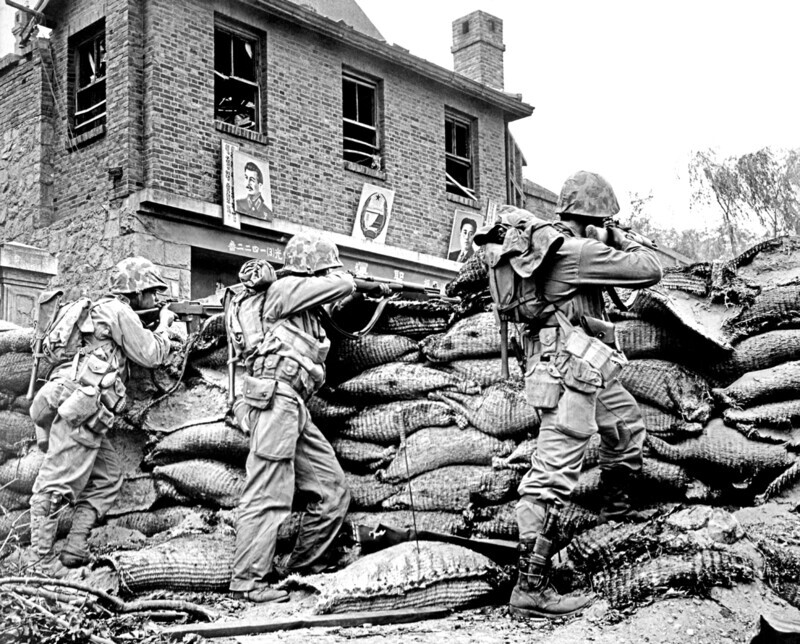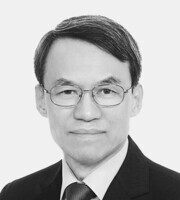hankyoreh
Links to other country sites 다른 나라 사이트 링크
[Column] The miscalculations that started the Korean War mustn’t be repeated


By Park Chang-seung, professor emeritus of history at Hanyang University
June 25 marked the 74th anniversary of the outbreak of the Korean War. This war, the deadliest event in 20th-century Korean history, also marked an intensification of the Cold War between the East and West internationally. However, the lead-up to the war involved serious misjudgments and miscalculations by the leaders of the countries involved.
Starting with North Korea, Kim Il-sung, who had dreamt of unifying the peninsula by force since the establishment of the regime, met with Soviet leader Joseph Stalin in the springs of both 1949 and 1950 to request support for a war. Initially, in 1949, Stalin refused, saying that the time was not yet right, but, by 1950, he acquiesced to Kim’s request.
At the time, Stalin asked Kim if he thought the US would intervene. Kim argued that since Washington did not intervene in the Chinese Civil War, it would not involve itself in a conflict in the much smaller Korea. He also assured Stalin that even if the US did decide to intervene, he planned to end the war quickly before the Americans would be able to, convincing the Soviet leader to lend his support. However, the US decided to intervene immediately after the war broke out and organized a coalition of UN forces to take the lead. In other words, Kim Il-sung completely misjudged the situation.
Moreover, Kim Il-sung and Pak Hon-yong believed that if they went to war and captured Seoul, the some 200,000 members of the Workers' Party of South Korea who remained in the South would revolt and overthrow the South Korean government. They also expected the North Korean forces to advance to the southern coast of the peninsula within a month, quickly ending the war. However, there was no leftist uprising, and South Korean and UN forces established a defensive line along the Nakdong River, holding out for about three months. Eventually, the situation completely reversed with the UN forces’ Incheon Landing Operation, and the war continued for nearly three more years.
According to the Institute for Military History Compilation of the Ministry of National Defense, around 130,000 South Korean soldiers died, and 450,000 were injured during the war. North Korean forces suffered a combined total of 520,000 deaths and injuries. The UN forces lost 30,000 soldiers and had 100,000 injured, while the Chinese experienced 130,000 deaths and 200,000 injuries. Civilian casualties were also high: in South Korea, approximately 240,000 civilians were killed and 120,000 were massacred, while North Korea saw about 280,000 civilian deaths. In the end, the only thing that North Korea gained was criticism for provoking an unnecessary war that caused tremendous casualties.
As for the Soviet Union, after successfully conducting a nuclear test in August 1949, Stalin appears to have gained a certain level of confidence in his country’s Cold War confrontation with the US. Additionally, after the Communist Party of China expelled the Nationalist government to Taiwan in September 1949 and established the People's Republic of China, he believed that the situation in East Asia had become favorable to the communists. It seems that Stalin had hoped that if Kim Il-sung's regime took control of the entire Korean Peninsula, Soviet influence could extend to its southern tip. He planned for China to send troops to support North Korea if Kim faced difficulties during the Korean War, as it would be challenging for the Soviet Union to send its own troops.
Stalin, who was most concerned about a potential US intervention, examined various pieces of intelligence, including a January 1950 speech by US Secretary of State Dean Acheson and a telegram from Gen. Douglas MacArthur. He concluded that the US defensive perimeter in the Pacific stretched from Japan to Okinawa and the Philippines, thereby excluding Korea. Convinced that the US would not intervene even if war broke out on the peninsula, Stalin gave Kim Il-sung the green light to initiate the conflict. However, Washington interpreted the war’s outbreak as a direct Soviet challenge through North Korea. In response, it immediately deployed forces from the Far East Command in Japan to Korea and sent the Seventh Fleet to Taiwan. In other words, Stalin’s prediction completely missed the mark, with the US forcefully responding to the USSR’s challenge amid the escalating Cold War.
Turning to China, during an April meeting with Kim Il-sung in Moscow, Stalin permitted the North Korean leader to launch the war on the condition that he receive approval from Mao Zedong. Thus, Kim Il-sung traveled to Beijing the following month to seek Mao's consent, informing him that Stalin had “already agreed” to the war. When Mao inquired with Stalin via telegram, Stalin confirmed his agreement but added that if his Chinese comrades did not agree, this issue should be discussed and decided upon again, implying that he wanted Mao to also share responsibility in starting the war.
Ultimately, despite his concerns about US intervention, Mao agreed, believing Stalin had already decided to proceed with the war. As the leader of the newly established People’s Republic of China, which required all manner of support from the Soviets, Mao could not help but be mindful of Stalin's wishes. However, because of his decision to support Kim then, Mao had no choice but to send some 260,000 troops to North Korea in October that same year, resulting in the death of about 130,000 Chinese soldiers by the end of the war.
With regard to the US, Washington withdrew all its troops from Korea except for a group of military advisers in June 1949. While this was partly in response to the withdrawal of Soviet troops from North Korea, it also overlooked the possibility of an invasion by Pyongyang. Even after the withdrawal of its troops, the US was more interested in economic than military aid to South Korea as it doubted that the Soviets would use the North to invade the South. Moreover, announcements like that of Acheson’s defensive perimeter further encouraged Moscow and Pyongyang, leading to the full-scale invasion of South Korea by North Korean forces supported by the Soviet military.
As for South Korea, the country engaged in frequent border clashes with North Korea after 1949. Due to its fears of a possible full-scale invasion by the North, Seoul requested substantial increases in military aid from the US, but these were denied. Washington viewed the likelihood of a North Korean invasion as low and was more concerned that increased military aid might prompt South Korea to invade the North. At the time, South Korea’s Syngman Rhee regime, despite how unprepared it was for a full-scale invasion by the North, was boasting about marching north to reunify the peninsula.
The lessons from the Korean War can be summarized as follows. First, if war breaks out on the Korean Peninsula, neighboring major powers like the US, Russia and China will intervene due to its geopolitical importance. Second, reunification of the Korean Peninsula cannot be achieved through a war meant to force one side to surrender; war will only result in tremendous human and material losses for both Koreas. Therefore, reunification should only be pursued through peaceful means. Third, Korean reunification remains difficult to achieve without the cooperation of surrounding major powers, including the US, China and Russia, which still have significant influence on the peninsula.
The leaders and citizens of the countries involved in the Korean War should never take these lessons lightly. Therefore, it is concerning that reality seems to be moving in the opposite direction.
Please direct questions or comments to [english@hani.co.kr]

Editorial・opinion
![[Editorial] Silence won’t save Yoon [Editorial] Silence won’t save Yoon](https://flexible.img.hani.co.kr/flexible/normal/500/300/imgdb/original/2024/0701/681719819632087.jpg) [Editorial] Silence won’t save Yoon
[Editorial] Silence won’t save Yoon![[Column] The miscalculations that started the Korean War mustn’t be repeated [Column] The miscalculations that started the Korean War mustn’t be repeated](https://flexible.img.hani.co.kr/flexible/normal/500/300/imgdb/original/2024/0630/9717197068967684.jpg) [Column] The miscalculations that started the Korean War mustn’t be repeated
[Column] The miscalculations that started the Korean War mustn’t be repeated- [Correspondent’s column] China-Europe relations tested once more by EV war
- [Correspondent’s column] Who really created the new ‘axis of evil’?
- [Editorial] Exploiting foreign domestic workers won’t solve Korea’s birth rate problem
- [Column] Kim and Putin’s new world order
- [Editorial] Workplace hazards can be prevented — why weren’t they this time?
- [Editorial] Seoul failed to use diplomacy with Moscow — now it’s resorting to threats
- [Column] Balloons, drones, wiretapping… Yongsan’s got it all!
- [Editorial] It’s time for us all to rethink our approach to North Korea
Most viewed articles
- 1Yoon’s prosecutors are throwing everything at the president’s opponents to see what’ll stick
- 2Japan is building a military meant for more than self-defense — and has the US to thank for it
- 3[Editorial] Silence won’t save Yoon
- 4NewJeans rocks Tokyo Dome as new, younger generation of K-pop fans emerges in Japan
- 5Dreams of a better life brought them to Korea — then a tragic fire tore them apart
- 6[Column] The miscalculations that started the Korean War mustn’t be repeated
- 7[Editorial] Exploiting foreign domestic workers won’t solve Korea’s birth rate problem
- 8S. Korea joins US, Japan for first multi-domain drills at a time of escalating tensions
- 9How million-strong candlelight demonstrations are being organized
- 10[Reportage] Inside N. Korean refugee protection center